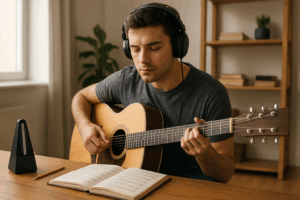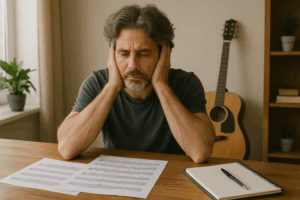Stage fright is a common challenge for many musicians, especially beginners. Whether you’re performing in front of friends, family, or a larger audience, the fear of making mistakes, being judged, or simply performing in front of others can be overwhelming. This anxiety, if not addressed, can hold you back from reaching your full potential and enjoying your musical journey.
But the good news is that stage fright can be managed, and with the right strategies, you can gain confidence in performing. In this article, we’ll explore effective ways to overcome stage fright and build your confidence as a beginner musician.
Why Stage Fright Happens
Before we dive into solutions, it’s important to understand why stage fright occurs. Fear of performing is a natural response to pressure and vulnerability, especially when you’re learning something new and trying to prove your abilities. Here are some common reasons for stage fright:
- Fear of Making Mistakes: Beginners often feel the pressure to perform perfectly, which can cause anxiety about making mistakes.
- Judgment from Others: Worrying about how others will perceive your performance can increase anxiety and fear of failure.
- Lack of Experience: As a beginner, you may feel unsure of your skills, which can make performing feel daunting.
Understanding that stage fright is common and completely normal can help you start addressing it.
1. Preparation is Key
One of the best ways to overcome stage fright is to be thoroughly prepared. The more confident you are in your ability to perform, the less likely you are to feel anxious. Good preparation also gives you a sense of control over your performance, which can reduce fear.
How to Prepare Effectively:
- Practice Consistently: Regular practice builds muscle memory and helps you feel more confident about your skills. When you practice consistently, you’ll be more prepared for any performance situation.
- Rehearse in Performance Conditions: To get used to performing, rehearse in front of family or friends. This helps you get comfortable playing in front of others and simulates the performance environment.
- Start Small: Begin by performing small sections of a piece and gradually increase the length of your performances as you gain confidence.
Being well-prepared means that, even if you make a mistake, you’ll be able to recover quickly and confidently.
2. Visualize Success
Visualization is a powerful technique used by many performers to reduce anxiety and boost confidence. Before stepping onto the stage, take a few minutes to close your eyes and visualize yourself performing flawlessly. Imagine the positive feelings you’ll experience as you play through the music confidently.
How to Visualize:
- Find a quiet space before your performance.
- Close your eyes and imagine the venue, the audience, and yourself playing the music smoothly.
- Visualize overcoming obstacles during your performance, such as recovering from a mistake.
By practicing positive visualization, you train your mind to picture success, which can reduce feelings of anxiety and improve performance.
3. Focus on the Music, Not the Audience
Many musicians get caught up in thinking about the audience’s reaction, which can increase anxiety. Instead, try shifting your focus away from the audience and back to the music itself. When you focus on the beauty of the music and the joy of playing, you are less likely to become consumed by fear.
How to Stay Focused:
- Concentrate on the Sound: Focus on the sound of your instrument or your voice, and immerse yourself in the music.
- Play for Yourself, Not the Audience: Remember why you started playing music in the first place—because you enjoy it. Play for the joy of the music rather than seeking approval from others.
By shifting your attention away from the audience, you allow yourself to be fully immersed in the music, which can calm your nerves.
4. Accept Imperfection
One of the biggest causes of stage fright is the fear of making mistakes. However, no performance is perfect, and the reality is that most musicians, even professionals, make mistakes from time to time. Instead of fearing mistakes, embrace them as part of the learning process.
How to Accept Imperfection:
- Recognize That Mistakes Are Normal: Mistakes don’t define you as a musician. They’re part of the learning process. Accepting this can relieve a lot of performance anxiety.
- Keep Going After a Mistake: If you make a mistake during a performance, continue playing. Most of the audience won’t notice, and you’ll show resilience and professionalism by not letting it affect the rest of your performance.
- Learn from Mistakes: After your performance, reflect on what went well and what didn’t. Use mistakes as opportunities to improve and grow as a musician.
By accepting that mistakes are part of the journey, you’ll find it easier to let go of the fear of failure.
5. Use Relaxation Techniques
Physical tension can exacerbate feelings of anxiety. When you’re nervous, your body may tense up, making it harder to perform comfortably. Relaxation techniques can help you stay calm and reduce anxiety before and during your performance.
Effective Relaxation Techniques:
- Deep Breathing: Practice deep, slow breathing to calm your nerves before taking the stage. Breathe in through your nose for four counts, hold for four counts, and exhale through your mouth for four counts. Repeat several times.
- Progressive Muscle Relaxation: Tense and relax each muscle group in your body, starting from your toes and working your way up to your head. This helps release physical tension and relax your body.
- Stretching: Stretch your arms, neck, and shoulders before your performance to release any physical tension.
Relaxation techniques can help you calm both your mind and body, leading to a more confident performance.
6. Start Performing in Low-Pressure Situations
If you’re a beginner, start by performing in low-pressure environments before moving on to larger audiences. This can help you build confidence and get used to the feeling of performing without the intense pressure of a formal stage.
Ways to Start Small:
- Play for Friends or Family: Performing for a small group of people you feel comfortable with can be a great way to practice performing.
- Open Mic Nights or Community Events: Look for opportunities to perform in front of small audiences where the pressure is lower.
- Record Yourself: Play in front of a camera or a mirror to simulate performing. Watching the recording will help you spot areas for improvement.
Starting in low-pressure situations will gradually help you build the confidence you need for bigger performances.
7. Remember Why You’re Performing
Finally, it’s important to remember why you’re performing in the first place. Performing is an opportunity to share your music with others, express yourself, and enjoy the experience of creating music. When you focus on the joy of playing rather than the fear of being judged, you’ll feel more relaxed and confident.
How to Stay Grounded:
- Focus on the Art: Remember that music is an art form, and performances are meant to be an expression of your creativity, not a test of your abilities.
- Enjoy the Moment: Instead of worrying about perfection, embrace the experience of performing. Have fun with it!
When you keep the focus on the music and the experience, the anxiety around performing will naturally lessen.
Stage fright is a common challenge for many beginner musicians, but it doesn’t have to hold you back. By preparing effectively, using relaxation techniques, and focusing on the joy of playing, you can build the confidence to perform in front of others with ease. Remember that mistakes are part of the journey, and every performance is an opportunity to grow as a musician.
With practice and the right mindset, you’ll not only overcome stage fright, but you’ll also enjoy performing and sharing your music with the world. Keep practicing, stay positive, and take every opportunity to perform—you’ve got this!




